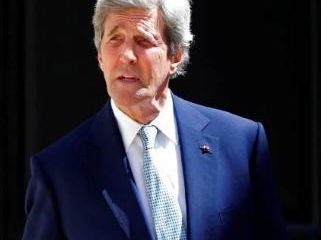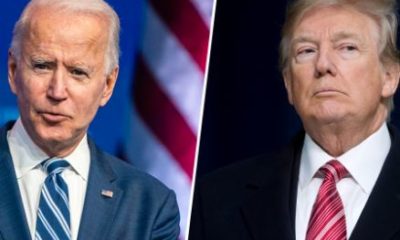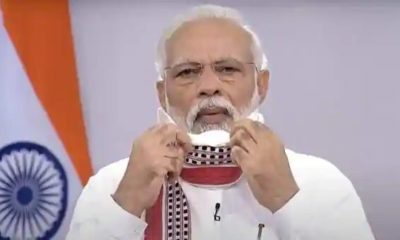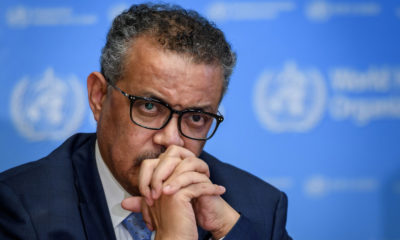World
Yoga not Indian, Sadhguru tells UN in rhetoric challenge
United Nations: “Yoga is not Indian” and “it does not belong to India”, mystic and yoga master Sadhguru Jaggi Vasudev told a UN meeting on Monday with a rhetorical flourish.
He asserted that this was because yoga was “an absolute science and technology for well-being”. He added: “Science cannot be Indian” because of its universality and absoluteness.
“Yes, it originated in India,” he told a multinational audience of diplomats and international officials.
“As Indians we are proud of it. But it does not belong to India. The very fact that the UN has declared an International Yoga Day means India has gifted it to the world. It does not belong to India any more.”
Vasudev was speaking at the Yoga Day eve event “Conversation with Masters: Yoga for the Achievement of Sustainable Development Goals (SDGs).”
As part of Yoga Day celebrations, a series of yoga poses were projected on to side of the UN Secretariat building on Monday night.
On Tuesday, Yoga Day will be formally celebrated with a yoga session at which Mogens Lykketoft, president of the General Assembly, will be the chief guest and Under Secretary General Cristina Gallach will be a featured speaker.
In his address, Vasudev focused on yoga as a science and technology for human betterment that, he said, went beyond just physical well-being.
The path to achieving those goals starts with the individual, he said. “You cannot transform the world without changing the individual. The world is a larger manifestation of who we are.”
Just the short-sighted pursuit of “well-being” can be counterproductive, Vasudev said, citing the ecological degradation that has resulted from it. Human well-being has to be addressed in a scientific way and everyone has to realise the universal oneness to achieve true well-being.
This is where yoga came in as a scientific way of obliterating individual boundaries, he said.
To popularise yoga, Vasudev said, begin with ‘upayoga’ for those who are not ready to deal with the spirituality of it. Upayoga starts with the physical and psychological aspects, he said.
“The significant aspect of my personal work has been to remove all the frills of culture that yoga had acquired through this millennia of transmission,” Vasudeve said.
“So one thing is to take off all the cultural frills and present it as an absolute science and a technology for well being.”
This was important in an environment where there were people of different nationalities, beliefs and ideologies, Vasudev said.
“It is very very important that yoga is brought as a proper science, not as a cultural thing, not as an Indian thing.”
India’s Permanent Representative Syed Akbaruddin said that “both aspects of yoga, mindful thought and mindful action, have a direct bearing on our collective response to global problems”.
The meeting was an attempt to “delve into this intellectual side of yoga and to relate it to the political vision we have collectively set ourselves in the form of the SDGs”, he added.
Tao Porchon-Lynch, who at 97 years is considered the world’s oldest yoga teacher in a formal setting, was the other yoga master at the meeting. She recalled her meeting with Mahatma Gandhi, who she said told her “not to be afraid. When you believe in something, go and do it”.
That advice helped her join the French Resistance against Nazi Germany during World War II, she said.
The World Health Organisation’s (WHO) executive director at the UN office, Nata Menabde, said yoga was India’s gift to the world and it was special because of that.
WHO was trying to integrate yoga and traditional practices into the allopathic medicine system and primary health services. To further this, India and WHO had recently signed an agreement.
Ambassadors gave personal testimonies of how they relate to yoga.
Liechtenstein’s Permanent Representative Christian Wenaweser said he had approached yoga from a “non-spiritual place” yet it helped him “connect to myself and to others.”
Wenaweser conducts yoga lessons for diplomats and others at the UN.
Masud Bin Momen, the Permanent Representative of Bangladesh, said he was suffering from sciatica and yoga was the answer to his condition, especially the cobra pose.
Nepal’s Permanent Representative Durga Prasad Bhattarai decried the “over-commercialisation” of yoga.
Vasudev said that whatever became popular was susceptible to commercialisation. “On the surface there may be disturbance, but the core is undisturbed.”
National
Foodman Vishal Singh Honored for Hunger Free World Mission in Bangkok

Lucknow: Vishal Singh, a renowned social worker from Lucknow, also known as Foodman, has once again made India proud. He was honored by the Happy Hands Gloves Cooperative Limited Company in Korathai, Thailand, for his work with the Hunger Free World Mission.
The Hunger Free World Mission’s meeting was held in Korathai, Thailand, under Vishal Singh’s leadership. Representatives from several countries, including Mr. Raja Dwivedi (Managing Director of Happy Hands Gloves Limited), Thailand Coordinator Mr. Raja Mishra, and member Mr. Varun Singh, attended the event.

Under Vishal Singh’s leadership, the attendees took a pledge to work together toward creating a hunger-free world.
Speaking on the occasion, Vishal Singh explained that the main goal of the Hunger Free World Mission is social participation. He said the mission is not just about feeding people but also about meeting other basic needs of those who are struggling. The mission focuses on helping families of terminally ill patients in hospitals by providing food and shelter. It also works to fulfill essential needs like education, jobs, and care for the elderly.
For the last 16 years, the Vijay Sri Foundation has been providing free services, benefiting thousands of people. Vishal Singh highlighted that the mission aims to gain global recognition like other organizations such as WHO, WWF, and Red Cross, which work for social causes.
During this meeting, Vishal Singh was appointed as the Chairman of the Hunger Free World Mission by representatives from various countries. They also discussed holding regular meetings in different countries to push the mission forward.
Business tycoon Dr. Abhishek Verma has also supported this humanitarian mission, vowing to promote the idea of “Seva Parmo Dharma” (Service is the highest duty) worldwide. Vishal Singh praised him, stating that people like Dr .Abhishek Verma inspire others to work for the betterment of society.
Recently, Romania’s Ambassador, Mr . Daniela Sezonov Ţane, invited Vishal Singh to the Romanian Embassy in Delhi, where they discussed the mission in detail. Impressed by his humanitarian work, she honored Vishal Singh and invited him to Romania to take the mission forward .
Food man Vishal Singh has been serving the people of India for the past 16 years. Through the Vijay Sri Foundation, he provides free meals to cancer patients & their families ,shelter, and education for women & children along with running free old-age homes in Lucknow.
In addition to his humanitarian work, Vishal Singh also addresses issues like crime and corruption through his role as Chairman of Seva Path Media and Managing Director of Vijay Sri Foundation.

During the COVID-19 pandemic, Vishal Singh and his team worked tirelessly to provide food and help to the needy, including starving children, elderly citizens, and pregnant women. Despite contracting the virus himself, he continued to assist others after his recovery. He even created a life-saving oxygen regulator using household items, which was praised by doctors both in India and abroad.
In his address at the meeting, Vishal Singh spoke about his mission to create a hunger-free world. He pointed out that India’s large population, along with issues like unemployment and poverty, has caused the country to fall on the Hunger Index. He urged people to contribute just one handful of grains daily to help create a hunger-free world.
He concluded by saying that through social participation, we can empower the people around us, meet their basic needs, and work together to build a stronger, more prosperous, and developed society.
























